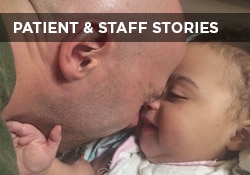This website uses cookies so that we can provide you with the best user experience possible. Cookie information is stored in your browser and performs functions such as recognising you when you return to our website and helping our team to understand which sections of the website you find most interesting and useful.

Susan E. Mazer, Ph.D. Blog
Thoughts and ideas on healthcare
Hi, and welcome to my blog! I'm Susan E. Mazer -- a knowledge expert and thought leader on how the environment of care impacts the patient experience. Topics I write about include safety, satisfaction, hospital noise, nursing, care at the bedside, and much more.
From Post-Traumatic Stress Syndrome to Post-Traumatic Hospital Syndrome
February 8, 2013
So, the term “post-hospital syndrome” does not say “traumatic” but its definition certainly implies just that. An article by Dr. Harlan Krumholz on the topic in the New England Journal of Medicine recently points out that taking care of all things biological does not take care of all things human.
In fact, being treated in the hospital can itself pose other risks — thus, post-hospital syndrome (PHS). Dr. Krumholz points the cause of PHS as “allostatic and physiological stress,” a condition caused by a continuous series of stressful events without enough time to recover.
Further, the stress is linked to everything from the illness itself to disrupted sleep, strangers invading personal space, uncertainty, and information overload. The nature of hospitalization itself renders patients with a compromised immune system, putting them at risk of illnesses not necessarily related to what brought them there in the first place.
What can we reasonably expect from our healthcare systems? What do we have a right to receive if we are injured and turn our lives and bodies over the physicians, nurses, and hospitals? Perhaps hospital experiences do not end at discharge but rather they wash over into the rest of ones’ life.
This was the very question we asked in developing The C.A.R.E. Channel. What will patients and families remember about the kind of care and caring they received? Was there evidence of an intent to heal, to calm, to comfort? Beyond clinical demands, was there any acknowledgment of fear, anxiety, and the angst that is only felt when one is a patient?
Dr. Krumholz ends with the warning that hospitals must become less toxic. True, but becoming “less toxic” is not being “non-toxic,” let alone “healing.”
Susan E. Mazer, Ph.D., is President and CEO of Healing HealthCare Systems, producers of The C.A.R.E. Channel relaxation programming for patient television. She is also an Adjunct Faculty member at Saybrook University, College of Mind-Body Medicine, as well as an accomplished speaker, author, and musician.










